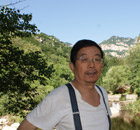-
-
China Daily E-paper
Web Comments
Inmate deaths a blot on judicial system
By Dong Jidong (Chinadaily.com.cn)
Updated: 2010-04-15 09:53
 |
Large Medium Small |
In recent years, there have been so many reports of unnatural deaths in China’s detention houses that people start to accept them as part of life.
Yet sometimes, the ways that inmates die can still go beyond one’s wildest imagination.
In the latest case, a 1.8-meter-tall (nearly six feet) inmate in a detention center in Tangshan, Hebei province, died of TB early this month, weighing only 35 kg after being behind bars for only 11 months. The picture of his body, widely circulated on the Internet,reminds people of the living skeletons in Auschwitz in World War II.
Relatives said the center repeatedly refused his requests to see a doctor after he felt ill, and instead put him under heavy and inhumane physical workload despite his worsening health condition. The authorities denied any wrongdoing.
I don’t know how many more deaths will be considered enough for the local authorities to wake up from their slumbering conscience about the value of life. It is tantamount to an insult to the Chinese people’s collective intelligence if police continue to tell us that suspects and inmates can die after bumping into a wall playing hide-and-seek, or drinking a glass of boiled water, or having a nightmare, or being drowned in a sink, as claimed by police in the past to explain mysterious deaths in detention.
All these have shaken the public confidence in China’s judicial system.
In fact, these cases are only the tip of the iceberg. Forced confessions, torture and bullying in prison have always remained a thorny issue in our judicial system, and hurt the country’s human rights image in the world community.
That might explain why over 400 delegates decided to express their dissatisfaction and voted against the work reports delivered by the Supreme People’s Court and the Supreme People's Procuratorate to the National People’s Congress this March.
With regard to the protection of citizens’ rights, it might be useful for us to learn from the experience of others. When watching the scenes of suspects being arrested in American movies and TV shows, we will probably hear the famous Miranda Warning: “You have the right to remain silent. Anything you say can and will be used against you in a court of law. You have the right to have an attorney present during questioning. If you cannot afford an attorney, one will be appointed for you.” It has served as an example of procedural justice in the process of law enforcement.
We hope there will be fewer unnatural death cases. To achieve the lofty goal of building a harmonious society, we need not only to let people live with dignity, but also to let them rest in peace.









